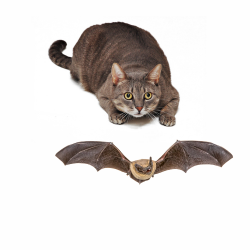
Cats are known for their unique eating habits, hunting all sorts of creatures that come their way. From beetles to mice, their appetite knows no bounds. But what about bats?
This intriguing question has sparked curiosity among pet owners and animal enthusiasts alike. So, let’s uncover the truth about cats and their interest in bats!
Do Cats Find and Hunt Bats?
Cats possess exceptional hearing and a keen sense of smell, which enables them to detect bats in various places, including attics, trees, cracks, and holes in houses, as well as outdoor areas near forests and waterways. However, it is important to note that cats may not be able to catch bats easily due to the flying creatures’ evasive nature. While cats may exhibit curiosity towards bats, it is not recommended for them to engage in such interactions.
Can Cats Eat Bats?
While it’s true that cats can eat bats, such occurrences are relatively rare. Bats tend to fly at heights that are typically out of reach for cats. However, there are cases, when felines are demonstrating exceptional skills in catching bats. Such behavior shows how diverse cat’s hunting instincts can be.
Is eating bats risky for cat’s health?
It is generally unsafe for cats to consume bats due to the potential transmission of diseases, particularly rabies. Bats are known carriers of various illnesses, and when a cat catches a bat, it can inadvertently scratch it, exposing itself to the bat’s fluids. Additionally, if a cat bites a bat, it further heightens the risk of potential harm.
Can Cat Get Sick After Consuming Bats (Including Rabies)?
If a cat eats a bat, it may experience sickness shortly afterward. Symptoms of a sick cat may include vomiting, diarrhea, swelling of the mouth, stomach pain, and gagging.
It’s important to note that bats are not clean or cooked meat, and consuming them can introduce bacteria and other health risks to the cat.
While the likelihood of a cat contracting rabies from a bat is relatively low, it is still possible. The transmission of rabies primarily occurs through saliva. Factors such as which part of the bat was eaten, the amount consumed, and the presence of rabies in the bat influence the risk.
If you suspect that your cat has consumed a bat, seeking immediate veterinary assistance is crucial. Testing and administering a rabies booster can provide reassurance and ensure the cat’s safety.
How To Keep Cats Safe?
If your cat manages to catch a bat, it is crucial to retrieve the bat promptly and prevent other wildlife from coming into contact with it. Safely secure the bat using protective gloves and arrange for its testing.
Additionally, placing your cat in mandatory quarantine while you handle the situation is advisable to prevent potential harm or transmission of diseases
How To Get Rid Of Bats?
Rather than relying on cats to rid your property of bats, it is advisable to explore safer and more effective methods.
These include filling holes and sealing cracks in your house, using bat repellents, removing potential food sources from your yard, employing bright lighting as a deterrent, and contacting professional pest control services.
Conclusion
While cats have the ability to catch bats, it is crucial to prioritize their safety and well-being.
Understanding the risks associated with consuming bats, the potential for disease transmission, and the importance of responsible supervision and proactive measures will help ensure a harmonious coexistence between cats and bats.
Implementing preventive measures, such as vaccination, close monitoring, and alternative bat control methods, ensures a harmonious environment for both cats and bats.
Share Your Thoughts In The Comments Below!
Happy Cat Care!
